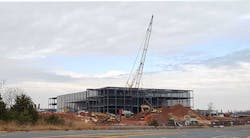Pandemic Poses Challenges for Data Center Construction, Supply Chain
In this series of stories, Data Center Frontier explores the strategic challenges the pandemic presents for the data center and cloud computing sectors as we navigate this complex new landscape. In this segment we look at how COVID-19 is impacting construction and the data center industry supply chain.
Data center providers say that construction continues to move forward, with only a handful of projects slowed or halted by COVID-19 safety concerns. But analysts expect that staffing shortages may persist over time, creating challenges for data center construction projects and the supply chain supporting them.
“The outbreak will start to slow the ecosystem down and the first area that might see this impact is data center construction projects,” said Structure Research, a research firm tracking the data center sector. “Supply chains and human resources are inevitably going to see some challenges, and this is how it can and will manifest. The good news is that data centers have been classified as a critical and essential service in jurisdictions around the world. There is reason to believe delays and disruption can be managed.”
“We believe it’s likely that most data center providers will experience some form of delay in construction and/or customer installation due to CV19,” said Colby Synesael, a Managing Director at Cowen. “We have heard very little that would suggest widespread delays in sourcing equipment used in the construction of a data center, as most data center operators and/or manufacturers currently have enough inventory in stock. The key question is how long will that last, with some suggesting that if certain countries and businesses are still shut down in 3 to 6 months, this aspect will become more problematic.”
Data Center Construction
At least one major hyperscale operator has cut back on construction. Facebook suspended construction at its data center campus in Clonee, Ireland after several workers at the site were tested for COVID-19. The company also halted work at its campus in Altoona Iowa.
“To help protect the health and safety of construction crews during the COVID-19 outbreak, we will temporarily pause construction activities at our site,” the Altoona facility said on its Facebook page. “We look forward to welcoming everyone back on site as soon as it is safe to do so.”
Facebook also “significantly reduced” construction activity at campuses in Oregon, Texas, New Mexico, Alabama and Virginia, saying it was “reducing staff to the core minimum number of people to be able to operate safely under current OSHA and CDC guidelines.”
The nature of construction can require teams to work together in close quarters, and the unfinished nature of job sites can make hand-washing less available than in an office or retail environment. Construction firms are being urged to stage crews to allow 6 feet of space between workers for proper social distancing, and to reduce choke points where workers might need to stand together, such as hallways, hoists and elevators.
“Construction folks want their people to continue to work, but make sure that they’re protected,” said Phillip Sandino of Data Energy Consultants, who is coordinating who is coordinating Digital Infrastructure Pandemic response on behalf of the Loudoun County (Va.) Department of Economic Development. “The operations and construction of data centers are both critical, and that includes fit-outs (of interior data halls). During this Coronavirus event, batteries will need to be replaced, equipment will need to be serviced ,and vendors will need to access the data centers.”
Amazon Web Services data centers in Loudoun County, Virginia. (Photo: Rich Miller)
Sandino said data center construction projects in Northern Virginia were continuing, as they are included in designations of essential work. In fact, the region’s largest cloud tenant, Amazon Web Services, has applied to fast-track its development of a three-building data center campus in South Riding.
For the moment, construction in most other major cloud markets seems to be moving ahead as well.
“Most data center construction projects are proceeding in the U.S., albeit with some reductions in productivity as a result of health precautions or labor constraints,” said Jonathan Atkin, a Managing Director at RBC Capital Markets. “In Europe, some industry contacts tell us that customer deployments and site construction have been impaired due to travel (particularly inter-country) and site-access restrictions. A key area of focus for data center operators has been workforce availability and productivity in order to maintain site operations and the pace of current development projects.”
“The immediate issue seems to be the availability of construction crews – particularly in hard hit areas like in Europe – and other human related aspects, like attaining permits,” said Synesael. “While this doesn’t appear to have had any notable impact on facilities that were largely complete and thus anticipated to open in (early 2020), we believe it’s likely to impact the timing of some facility openings later this year and into 2021.”
Penny Jones from 451 Research also saw possible schedule impacts down the line.
“Many providers have told us that construction work has not been halted, but we expect this could change soon as further WFH measures and restrictions are introduced across many global markets, said Jones in a research note. “Construction teams that are carrying out work have been kept segregated from live sites, with many only working now on new build projects as opposed to expansions at existing sites, to minimize risk to operational teams.”
Data Center Supply Chain
Construction is just one part of a complex supply chain that supports the data center and cloud computing business. In a recent report on COVID-19 risks, The Uptime Institute cautioned that there will be challenges ahead.
“All operators should anticipate supply chain disruptions and consider the potential for long term shortages of critical spares and consumables,” Uptime said. “Those with standardized supply chains, with uniform build processes, using prefabricated components and with supplier contracts already in place will be best positioned to withstand temporary disruptions.”
The largest developers of wholesale data centers, Digital Realty and Cyrus One, have close relationships with vendors that allow them to pre-order large equipment like generators and UPS units and have inventory to support 8 to 12 months of active development.
Analysts don’t yet see signs of production delays.
“Thus far, we are not aware of widespread supply-chain issues for key components related to power distribution, power back-up, cooling, electrical, or other infrastructure,” said Atkin. “We have encountered sporadic concerns about ‘smaller-ticket’ items such as racks and cabling.”
Uptime notes that the differing regional experiences of the Coronavirus pandemic poses a challenge.
“The digital infrastructure supply chain is global and interconnected,” writes Uptime. “It can take just one component shortage in one region to disrupt the global delivery of a product. Supply chain issues have been sporadically arising, but to date the majority have been overcome the mandated shutdown of factories across most provinces in China.
“The primary weakness in the supply chain has been people, with factory closures reducing availability,” it continued. “Much of IT component manufacturing remains (tied to) labor intensive components made in China, or other impacted areas, and may be less available for many months.”
Equipment provider Vertiv says it expects COVID-19 shutdowns of factories in China during January and February could reduce its first quarter sales by $70 million to $90 million. Schneider Electric also expects to see a significant impact from factory closures, which may reach $325 million in lost revenue. Uptime noted that several major manufacturing plants for heating, ventilation, and air conditioning equipment are in Italy.
“Some providers fear construction projects may run into their own supply chain difficulties or staffing challenges, especially where equipment comes from quarantined areas,” noted 451 Research. “This could push the pipeline out for many large projects throughout 2020 and even 2021.”
About the Author



